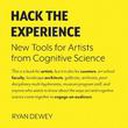Explore

Hack The Experience will reframe your perspective on how your audience engages your work. This will happen as you learn how to control attention through spatial and time-based techniques that you can harness as you build immersive installations or as you think about how to best arrange your work in an exhibition. You’ll learn things about the senses and how they interface with attention so that you can build in visceral forms of interactivity, engage people’s empathetic responses, and frame their moods. This book is a dense bouillon-cube of techniques that you can adapt and apply to your personal practice, and it’s a book that will walk you step-by-step through skill sets from ethnography, cognitive science, and multi-modal metaphors. The core argument of this book is that art is a form of cognitive engineering and that the physical environment (or objects in the physical environment) can be shaped to maximize emotional and sensory experience. Many types of art will benefit from this handbook (because cognition is pervasive in our experience of art), but it is particularly relevant to immersive experiential works such as installations, participatory/interactive environments, performance art, curatorial practice, architecture and landscape architecture, complex durational works, and works requiring new models of documentation. These types of work benefit from the empirical findings of cognitive science because intentionally leveraging basic human cognition in artworks can give participants new ways of seeing the world that are cognitively relevant. This leveraging process provides a new layer in the construction of conceptually grounded works.
This book is included in DOAB.
Why read this book? Have your say.
You must be logged in to comment.
Rights Information
Are you the author or publisher of this work? If so, you can claim it as yours by registering as an Unglue.it rights holder.Downloads
This work has been downloaded 91 times via unglue.it ebook links.
- 76 - pdf (CC BY-NC-SA) at OAPEN Library.
Keywords
- Cognitive science
- curatorial studies
- design theory
- Museology & heritage studies
- museum studies
- Reference, information & interdisciplinary subjects
- sensory engineering
- thema EDItEUR::G Reference, Information and Interdisciplinary subjects::GL Library and information sciences / Museology::GLZ Museology and heritage studies
Links
DOI: 10.21983/P3.0206.1.00Editions


